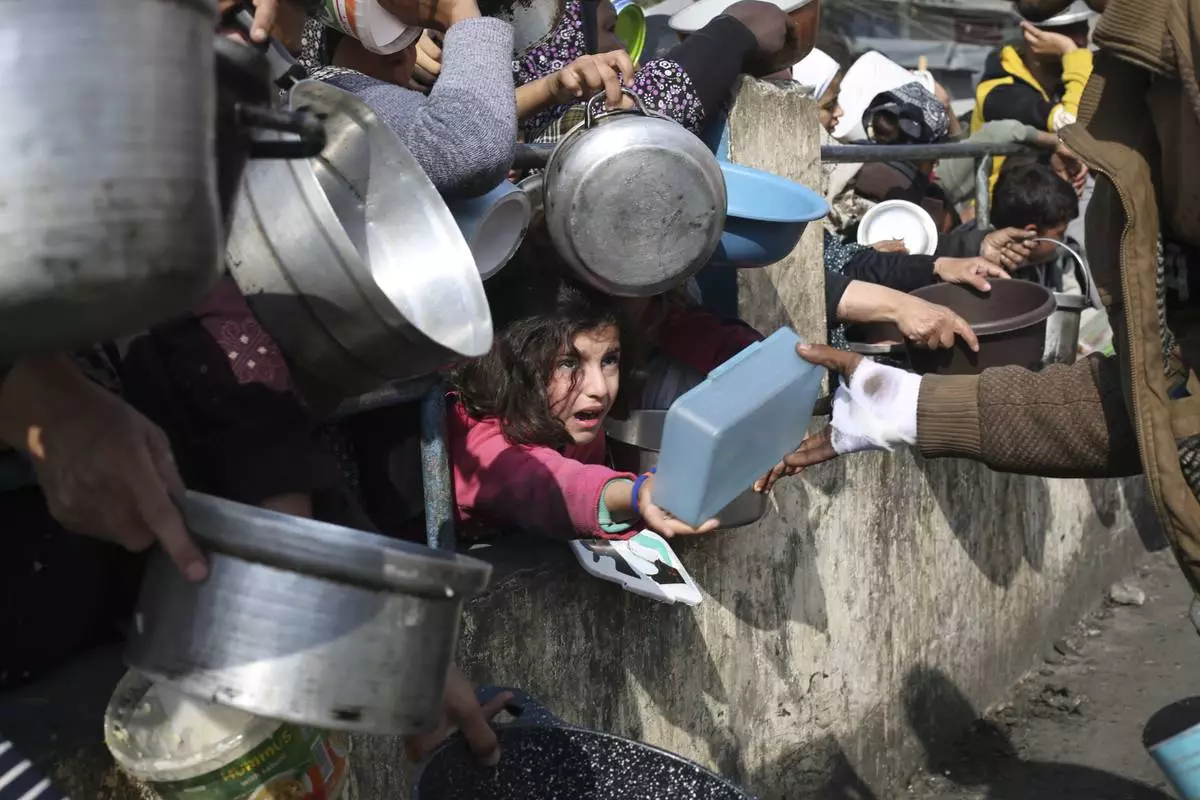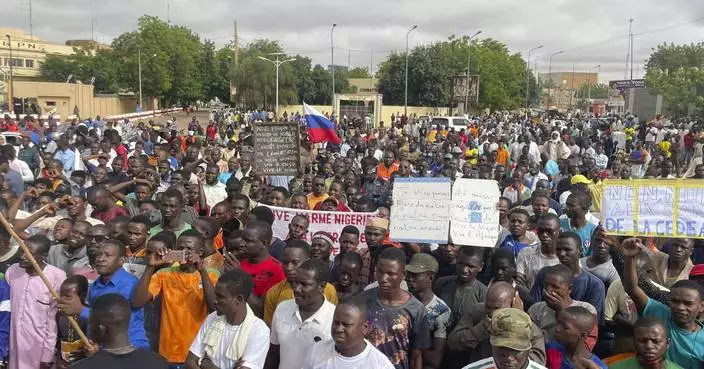Immigrant rights activists can continue to challenge what they describe as unlawful U.S. government delays in asylum cases, a federal judge has ruled.
U.S. District Judge Marsha Pechman in Seattle dismissed some arguments raised by the lawsuit in a ruling Tuesday, but she said the activists can pursue their claim that the delays violate the due process rights of detained asylum seekers across the country. The government sought to dismiss the case.
The Seattle-based Northwest Immigrant Rights Project filed the lawsuit in June against U.S. Immigration and Customs Enforcement, which said through a spokeswoman Wednesday that it does not comment on pending litigation.
According to the complaint, migrants seeking asylum after entering the U.S. illegally have had to wait weeks or months for their initial asylum interviews, at which an immigration officer determines whether they have a credible fear of persecution or torture in their home country. After that, there have been long delays in getting bond hearings, which determine whether an asylum seeker will be released from custody as the case proceeds.
"They're doing what they can to keep people locked up for prolonged periods and block asylum seekers from moving forward with their claims," Northwest Immigrant Rights Project legal director Matt Adams said Wednesday. "What we've seen firsthand is many asylum seekers give up after they've been locked up for weeks or months without ever getting a bond hearing," and opt to be deported rather than exercise their legal right to seek asylum.
The group initially filed the lawsuit in response to the administration's family separations at the U.S.-Mexico border, saying the delays had kept mothers detained at the Northwest Detention Center in Tacoma, Washington, from being reunited with their children in immigration custody across the country. Those plaintiffs have since been released, but the lawsuit seeks class-action status on behalf of thousands of asylum seekers.
The complaint asks the judge to order the government to make credible fear determinations within 10 days and to conduct bond hearings within seven days of an asylum seeker's request for one.
The government argued that such deadlines are not required by law and that the court doesn't have jurisdiction to impose them. In its motion to dismiss, the Justice Department argued that because the detainees have only just arrived in the U.S. without being granted admission, they "lack a constitutional right to demand expedited procedures for such hearings."
Pechman disagreed, saying that because the detainees had crossed into the U.S. they were entitled to greater constitutional protections than the government claimed.
"Simply put, are they 'excludable aliens' with little or no due process rights, or are they aliens who are in the country illegally, but nevertheless in the country such that their presence entitles them to certain constitutional protections?" she wrote. "Plaintiffs have adequately plead that they were within the borders of this country without permission when detained, and thus enjoy inherent constitutional due process protections."
Follow Gene Johnson at https://twitter.com/GeneAPseattle
WASHINGTON (AP) — Israel this week briefed Biden administration officials on a plan to evacuate Palestinian civilians ahead of a potential operation in the southern Gaza city of Rafah aimed at rooting out Hamas militants, according to U.S. officials familiar with the talks.
The officials, who were not authorized to comment publicly and requested anonymity to speak about the sensitive exchange, said that the plan detailed by the Israelis did not change the U.S. administration’s view that moving forward with an operation in Rafah would put too many innocent Palestinian civilians at risk.
Israeli Prime Minister Benjamin Netanyahu has vowed to carry out a military operation in Rafah despite warnings from President Joe Biden and other western officials that doing so would result in more civilian deaths and worsen an already dire humanitarian crisis.
The Biden administration has said there could be consequences for Israel should it move forward with the operation without a credible plan to safeguard civilians.
“Absent such a plan, we can’t support a major military operation going into Rafah because the damage it would do is beyond what’s acceptable,” U.S. Secretary of State Antony Blinken said late Friday at the Sedona Forum, an event in Arizona hosted by the McCain Institute.
Some 1.5 million Palestinians have sheltered in the southern Gaza city as the territory has been ravaged by the war that began on Oct. 7 after Hamas militants attacked Israel, killing 1,200 people and taking about 250 hostages.
The United Nations humanitarian aid agency on Friday said that hundreds of thousands of people would be “at imminent risk of death” if Israel moves forward with the Rafah assault. The border city is a critical entry point for humanitarian aid and is filled with displaced Palestinians, many in densely packed tent camps.
The officials added that the evacuation plan that the Israelis briefed was not finalized and both sides agreed to keep discussing the matter.
White House press secretary Karine Jean-Pierre told reporters on Friday that no “comprehensive” plan for a potential Rafah operation has been revealed by the Israelis to the White House. The operation, however, has been discussed during recent calls between Biden and Netanyahu as well as during recent virtual talks with top Israeli and U.S. national security officials.
“We want to make sure that those conversations continue because it is important to protect those Palestinian lives — those innocent lives,” Jean-Pierre said.
The revelation of Israel's continued push to carry out a Rafah operation came as CIA director William Burns arrived Friday in Egypt, where negotiators are trying to seal a cease-fire accord between Israel and Hamas.
Hamas is considering the latest proposal for a cease-fire and hostage release put forward by U.S., Egyptian and Qatari mediators, who are looking to avert the Rafah operation.
They have publicly pressed Hamas to accept the terms of the deal that would lead to an extended cease-fire and an exchange of Israeli hostages taken captive on Oct. 7 and Palestinian prisoners in Israeli jails.
Hamas has said it will send a delegation to Cairo in the coming days for further discussions on the offer, though it has not specified when.
Israel, and its allies, have sought to increase pressure on Hamas on the hostage negotiation. Signaling that Israel continues to move forward with its planning for a Rafah operation could be a tactic to nudge the militants to finalize the deal.
Netanyahu said earlier this week that Israeli forces would enter Rafah, which Israel says is Hamas’ last stronghold, regardless of whether a truce-for-hostages deal is struck. His comments appeared to be meant to appease his nationalist governing partners, and it was not clear whether they would have any bearing on any emerging deal with Hamas.
Blinken visited the region, including Israel, this week and called the latest proposal “extraordinarily generous” and said “the time to act is now.”
In Arizona on Friday, Blinken repeated remarks he made earlier this week that "the only thing standing between the people of Gaza and a cease-fire is Hamas.”

The Chahine family prepares to bury two adults and five boys and girls under the age of 16 after an overnight Israeli strike in Rafah, southern Gaza Strip, Friday, May 3, 2024. An Israeli strike on the city of Rafah on the southern edge of the Gaza Strip killed several people, including children, hospital officials said Friday. (AP Photo/Ismael Abu Dayyah)

FILE - Palestinians line up for free food during the ongoing Israeli air and ground offensive on the Gaza Strip in Rafah, Jan. 9, 2024. A top U.N. official said Friday, May 3, 2024, that hard-hit northern Gaza was now in “full-blown famine" after more than six months of war between Israel and Hamas and severe Israeli restrictions on food deliveries to the Palestinian territory. (AP Photo/Hatem Ali, File)

Palestinians rescue a woman survived after the Israeli bombardment on a residential building of Abu Alenan family in Rafah, southern Gaza Strip, early Saturday, May 4, 2024. (AP Photo/Ismael Abu Dayyah)

President Joe Biden walks across the South Lawn of the White House as he talks with White House press secretary Karine Jean-Pierre Thursday, May 2, 2024, in Washington, after returning from a trip to North Carolina. (AP Photo/Mark Schiefelbein)













